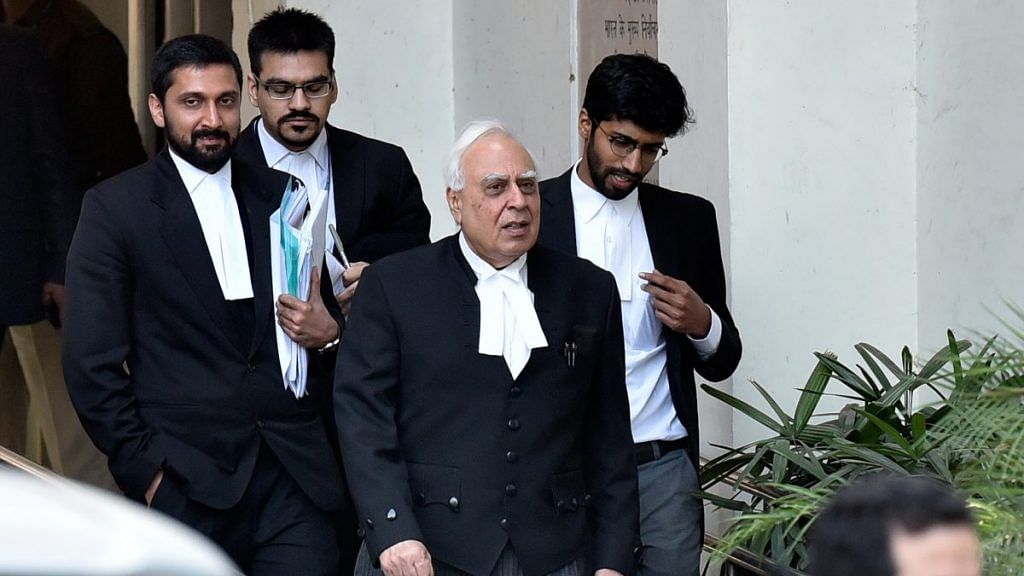Sibal has appeared as counsel in the triple talaq and Ayodhya title cases, and the Congress has dilly-dallied rather than denouncing his loaded statements.
When a core member of your political party is also an eminent practicing lawyer, more often than not, you end up defending the lawyer in public while he continues to play unabashed politics in the courtroom.
Kapil Sibal, a former Union minister in the UPA regime, is one such lawyer. He needs to use disclaimers more often than others in order to prevent his arguments from being construed as those of the Congress party.
But it appears to many now that Sibal is deliberately trying to blur the lines between his profession and politics. In 2017, Kapil Sibal has appeared in the triple talaq and Ram Janmabhoomi-Babri Masjid cases, both of which evoked high religious and political sentiments.
After the Shah Bano debacle, the Congress has refrained from taking a ‘public’ stance on matters of religious importance. This not only gives the party sufficient ideological room to manoeuvre, it also gives the party enough time to weigh political ramifications.
However, that has not stopped Sibal.
Strike 1
As a counsel appearing in the Ayodhya title case, Sibal made a politically charged legal argument, and requested the court to adjourn the 25-year old case till 2019. He did this because he said he was convinced that the court’s verdict could influence the 2019 Lok Sabha elections.
Three questions arise from his statement. One, if he was representing the case in his personal capacity, why did he cite political concerns? Two, does he not believe in the justice delayed-justice denied principle? Three, for a nation that grapples with frequent elections, does he really believe there will be an electorally-sanitised window for this?
Going by Sibal’s argument, the court should put a moratorium on any civil litigation, for the fear of its electoral implications. Unfortunately, the Congress party has defended Sibal openly, obliquely accepting that Ayodhya is of electoral significance.
Also it raises questions on the Congress’s stand on the temple issue. Instead of losing ground by defending a professional lawyer, the party should come out and demand resolution of the case. This could be the last nail in the party’s claim to a secular ideology.
Strike 2
Sibal, counsel for the All India Muslim Personal Law Board (AIMPLB), had opposed the ban on triple talaq, terming the despicable practice as a “matter of faith”. While he did concede that the practice was sinful, he continued to defend the indefensible, citing one weak argument after another. He even went on to normalise the practice, justifying it as an outcome of a patriarchal society. Eventually, triple talaq failed the test of constitutional validity, embarrassing both Sibal and the Congress party for not summoning enough courage to state the obvious. Although both Congress and Sibal hailed the ban post-verdict, considerable damage was done.
While the former Union Minister of Law and Justice was defending the sinister evil of triple talaq, the Congress refused to communicate its stance. The party neither dissociated itself from Sibal’s point of view, nor did it oppose the ban. This sent out a message to the aggrieved party, i.e. Muslim women, that the Congress party saw merit in triple talaq. As a party that boasts of preserving the secular, liberal values of Nehru, why was the party maintaining stoic silence on such a regressive issue?
Strike 3
Rahul Gandhi’s visit to the controversial Somnath temple drew some irrelevant questions from the BJP about his religion. The very next day, Sibal was back to being the capricious politician. He not only played into the hands of BJP by giving the party lessons on religion, he also alleged that the Prime Minister was not a “real” Hindu. It is outright sloppy for an astute politician to play on a losing turf.
The Congress did not distance itself from Sibal’s allegation, nor did it condemn encroachment of religion into political discourse. In fact, the party acquiesced to the BJP’s narrative by sharing evidence of Rahul Gandhi’s religion.
The Modi regime is undoubtedly a turning point in Indian politics, where both the ruling dispensation and the opposition have used religion as an elixir that guarantees electoral success. Both have become pawns of religion, a fear our founding fathers often expressed.
The author is a policy analyst based in New Delhi
